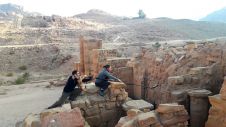Restructuring Old Degrees
The Schools of Topography, Geodesy and Cartography (both civil and military) in Spain, Portugal and Ibero-America have traditionally been in charge of the training of specialists in capturing and visualising Geographic Information (GI). Today only one of the five Open Geospatial Consortium-(OGC) associated university members from these countries belongs to this field of technology. Of the remaining four, three are groups associated with Computer Science Departments and the other focuses on earth ecological systems. It would seem that the aims of OGC are still poorly integrated within the Schools of Topography or Land Surveying in these regions.
This in spite of the fact that three essentials relating to GI, ISO 19000 Standards, the INSPIRE Initiative and OGC Specifications, are leading to substantial modification in methods and technology associated with GI. These three factors are laying the foundations for the establishment of Spatial Data Infrastructures (SDIs). Like many other countries, Spain has created its own SDI and is embracing the standards that enable information sharing through internet-based distributed architectures and services. SDI development is the most significant trend in GI and it is leading to a paradigmatic change in the use of spatial technologies.
This should produce a radical change in the training given at traditional Land Surveying Engineering Schools, which have so far specialised mainly in the processes of capturing data. Schools need to adjust their curricula because the SDI trend will result in society requiring more professionals expert in the management, visualisation and distribution of geodata, rather than in data capture, which will gradually become more automated and less specialised. Interoperability and distributed database access to promote decision-making based on geographic reality determine not only the type of skills but also the type of professional thinking that students must acquire. Geomatics training must reflect these requirements so that geomatics supports the objectives of an information and communication society. Awareness of this is essential among people responsible for designing GI university programmes related to Land Surveying.
The fact that the Instituto Geográfico Nacional (IGN) supports the work of ISO, INSPIRE and OGC should be sufficient to motivate Topography Departments to cover these topics in their programmes. Unfortunately, this is not happening in the Iberian Peninsula, or in Ibero-American countries. It is therefore necessary to design a programme intended to amend this situation by providing university departments concerned with GI with the knowledge necessary to bring about changes in their curricula.
The GI Technology Lab of the Universidad Politécnica of Madrid (www. mercator.es), supported by IGN and the Research Group Mercator has the intention of promoting this new approach in Topography, Geodesy and Cartography, and other related departments of universities in Spain and Ibero-America.

Value staying current with geomatics?
Stay on the map with our expertly curated newsletters.
We provide educational insights, industry updates, and inspiring stories to help you learn, grow, and reach your full potential in your field. Don't miss out - subscribe today and ensure you're always informed, educated, and inspired.
Choose your newsletter(s)
























